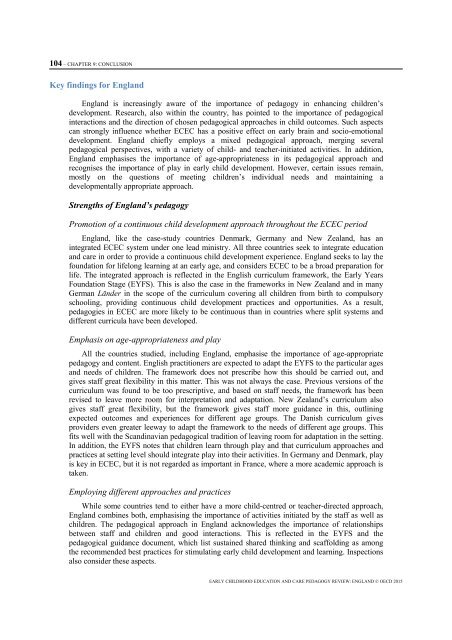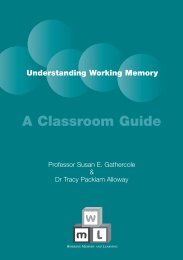early-childhood-education-and-care-pedagogy-review-england.pdf?utm_content=bufferb49b1&utm_medium=social&utm_source=twitter
early-childhood-education-and-care-pedagogy-review-england.pdf?utm_content=bufferb49b1&utm_medium=social&utm_source=twitter
early-childhood-education-and-care-pedagogy-review-england.pdf?utm_content=bufferb49b1&utm_medium=social&utm_source=twitter
Create successful ePaper yourself
Turn your PDF publications into a flip-book with our unique Google optimized e-Paper software.
104 – CHAPTER 9: CONCLUSIONKey findings for Engl<strong>and</strong>Engl<strong>and</strong> is increasingly aware of the importance of <strong>pedagogy</strong> in enhancing children’sdevelopment. Research, also within the country, has pointed to the importance of pedagogicalinteractions <strong>and</strong> the direction of chosen pedagogical approaches in child outcomes. Such aspectscan strongly influence whether ECEC has a positive effect on <strong>early</strong> brain <strong>and</strong> socio-emotionaldevelopment. Engl<strong>and</strong> chiefly employs a mixed pedagogical approach, merging severalpedagogical perspectives, with a variety of child- <strong>and</strong> teacher-initiated activities. In addition,Engl<strong>and</strong> emphasises the importance of age-appropriateness in its pedagogical approach <strong>and</strong>recognises the importance of play in <strong>early</strong> child development. However, certain issues remain,mostly on the questions of meeting children’s individual needs <strong>and</strong> maintaining adevelopmentally appropriate approach.Strengths of Engl<strong>and</strong>’s <strong>pedagogy</strong>Promotion of a continuous child development approach throughout the ECEC periodEngl<strong>and</strong>, like the case-study countries Denmark, Germany <strong>and</strong> New Zeal<strong>and</strong>, has anintegrated ECEC system under one lead ministry. All three countries seek to integrate <strong>education</strong><strong>and</strong> <strong>care</strong> in order to provide a continuous child development experience. Engl<strong>and</strong> seeks to lay thefoundation for lifelong learning at an <strong>early</strong> age, <strong>and</strong> considers ECEC to be a broad preparation forlife. The integrated approach is reflected in the English curriculum framework, the Early YearsFoundation Stage (EYFS). This is also the case in the frameworks in New Zeal<strong>and</strong> <strong>and</strong> in manyGerman Länder in the scope of the curriculum covering all children from birth to compulsoryschooling, providing continuous child development practices <strong>and</strong> opportunities. As a result,pedagogies in ECEC are more likely to be continuous than in countries where split systems <strong>and</strong>different curricula have been developed.Emphasis on age-appropriateness <strong>and</strong> playAll the countries studied, including Engl<strong>and</strong>, emphasise the importance of age-appropriate<strong>pedagogy</strong> <strong>and</strong> content. English practitioners are expected to adapt the EYFS to the particular ages<strong>and</strong> needs of children. The framework does not prescribe how this should be carried out, <strong>and</strong>gives staff great flexibility in this matter. This was not always the case. Previous versions of thecurriculum was found to be too prescriptive, <strong>and</strong> based on staff needs, the framework has beenrevised to leave more room for interpretation <strong>and</strong> adaptation. New Zeal<strong>and</strong>’s curriculum alsogives staff great flexibility, but the framework gives staff more guidance in this, outliningexpected outcomes <strong>and</strong> experiences for different age groups. The Danish curriculum givesproviders even greater leeway to adapt the framework to the needs of different age groups. Thisfits well with the Sc<strong>and</strong>inavian pedagogical tradition of leaving room for adaptation in the setting.In addition, the EYFS notes that children learn through play <strong>and</strong> that curriculum approaches <strong>and</strong>practices at setting level should integrate play into their activities. In Germany <strong>and</strong> Denmark, playis key in ECEC, but it is not regarded as important in France, where a more academic approach istaken.Employing different approaches <strong>and</strong> practicesWhile some countries tend to either have a more child-centred or teacher-directed approach,Engl<strong>and</strong> combines both, emphasising the importance of activities initiated by the staff as well aschildren. The pedagogical approach in Engl<strong>and</strong> acknowledges the importance of relationshipsbetween staff <strong>and</strong> children <strong>and</strong> good interactions. This is reflected in the EYFS <strong>and</strong> thepedagogical guidance document, which list sustained shared thinking <strong>and</strong> scaffolding as amongthe recommended best practices for stimulating <strong>early</strong> child development <strong>and</strong> learning. Inspectionsalso consider these aspects.EARLY CHILDHOOD EDUCATION AND CARE PEDAGOGY REVIEW: ENGLAND © OECD 2015



